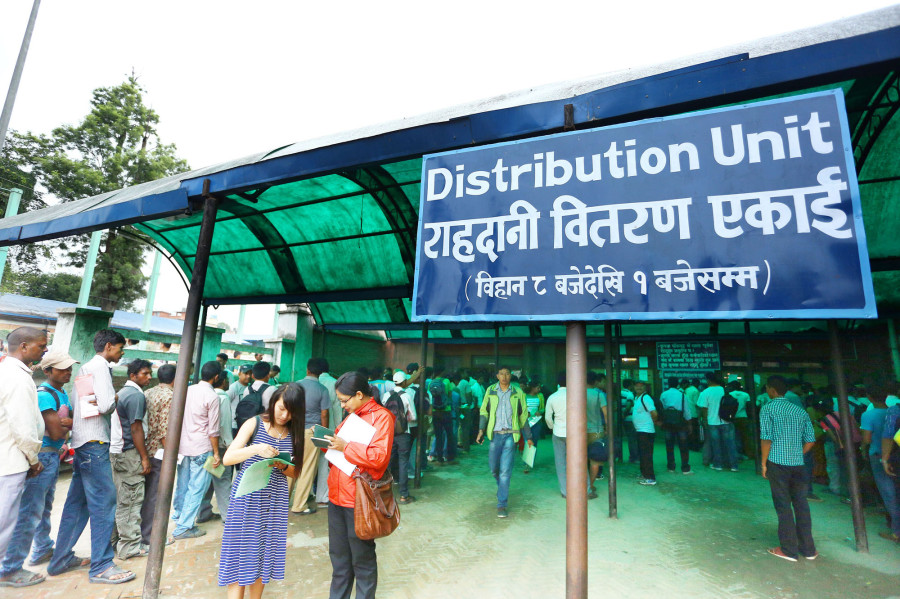National
After two failed attempts and a corruption scandal, passports to again be procured through a global tender
With the stock of passports fast running out, the Department of Passports has no choice but to consider calling for a global tender.
Anil Giri
After two failed attempts to procure passports, the Department of Passports is once again working to call a global tender to print and supply e-passports.
As the stock of machine-readable passports is fast running out, the Department of Passports is under pressure to arrange an alternative passport supply because of the large number of Nepalis who leave for foreign employment every month.
Earlier on November 8, the Department of Passports had cancelled an e-bidding notice for the printing, supply, delivery, installation, testing, commissioning and personalisation of machine-readable passports on the grounds that Nepal would establish its own security printing press.
But the plan to set up a security printing press has hit a roadblock after a minister in the Oli Cabinet was caught on tape negotiating a Rs700 million “commission” with the local agent of a Swiss company vying for the security press contract.
Hours after the audio recording was leaked, Gokul Baskota, minister for communication and information technology, resigned.
The parliamentary Public Accounts Committee has also asked the government to put the entire security printing process on hold for the moment.
But the number of passports is declining and the Department of Passports is going to call for a global tender, an official from the Prime Minister’s Office and another from the Ministry of Foreign Affairs told the Post.
“After Foreign Minister Pradeep Gyawali returns [from Geneva], a proposal to call for a global tender will be tabled at the Cabinet,” said the Foreign Ministry official. “If everything goes according to plan, the Department of Passports is likely to call for a global tender for e-passports within 10 to 15 days.”
On August 27, the department had issued a global tender for the printing and supply of 5 million e-passports for five years on a competitive basis that would cost the state around Rs 8 to 10 billion. The deadline for the supply and printing of e-passport was extended twice due to complaints from prospective bidders, who said that the tender did not provide a level-playing field for all.
“Some adjustments are expected though, as last time when we were planning to call the tender, it was for 5 million passports,” the official said. “We might call the tender for 2.5 million copies this time, so some price adjustments will be made.”
According to officials, 2.5 million copies will be enough to last two-and-a-half years, in which time Nepal is likely to have its own security printing press.
However, Ramkaji Khadka, director-general of the Department of Passports, refused to provide any details.
“An appropriate decision will be taken once Foreign Minister Gyawali returns from Geneva,” Khadka told the Post.
After the security printing press landed in controversy and two parliamentary panels started looking into possible financial irregularities, a team of government secretaries had advised the Ministry of Foreign Affairs to take an independent decision for a possible contingency plan, according to Dipak Subedi, secretary at the Ministry of Communication and Information Technology.
The government had earlier sought expressions of interest from Germany, France and Switzerland for the printing and delivery of passports. A contract was expected to be struck in a government-to-government deal but the plan was rejected after several officials at the Foreign Ministry and Department of Passports objected.
The government had also made attempts to sign a separate government-to-government deal with the French IN Groupe to supply and deliver passports, but this plan too was scrapped after the French company landed into controversy.
“We have been advising the government and officials to follow due process and go for competitive bidding but they ignored it and here are the results,” said Dharmashela Chapagian, a member of the Parliamentary Public Accounts Committee. “Any direct deal under the pretext of a Cabinet decision or a policy decision could be source of corruption or financial irregularities. But we are also clear that the government should not delay in the passport arrangement as there will be an uproar if there is a passport shortage.”




 9.89°C Kathmandu
9.89°C Kathmandu














